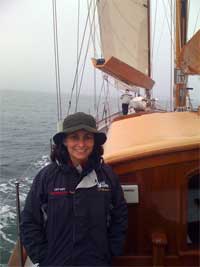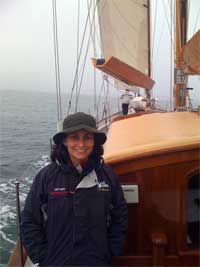 Danbury native studying ecosystem-based coastal management
Danbury native studying ecosystem-based coastal management
NARRAGANSETT, R.I. – January 26, 2011 – Tiffany Smythe taught high school English and history, worked on sail training ships for a decade, and helped guide the process of developing Rhode Island’s Ocean Special Area Management Plan. Now she has returned to complete her doctorate in marine affairs at the University of Rhode Island and has been named URI’s first Coastal Institute Graduate Fellow.
The fellowship provides Smythe with a $3,000 stipend to use towards her education and research expenses, as well as opportunities to participate in special events sponsored by the Coastal Institute. Judith Swift, director of the Institute, called Smythe “a spectacular example of URI at its best.”
A native of Danbury, Conn., who earned undergraduate and graduate degrees from Columbia University, Smythe said she developed a passion for the coastal and marine environment while working on sail training ships and decided to change careers and study marine policy. “I see this fellowship as support from the Coastal Institute for the type of work that I’m doing — trying to solve coastal management problems through interdisciplinary means,” she said.
The research she is conducting for her dissertation examines the capacity of decision makers to develop and implement coastal ecosystem-based management plans. In theory, these plans ignore political jurisdictions when managing a water body, focusing instead on the entire ecosystem.
“Resources like fish or water don’t respect political boundaries, so we need to look at the big picture,” Smythe said. “But it’s easier said than done.
“I suspect that it is very difficult for decision makers to undertake this kind of planning effort because government agencies and government jobs have narrowly-defined responsibilities,” she added. “I’m trying to assess how decision makers think about these planning efforts and how they collaborate with other agencies and people of different disciplinary backgrounds to do this planning.”
Smythe will spend the next several months conducting interviews and surveying resource managers. She considers herself a social scientist who uses the methods of policy analysts, sociologists and anthropologists to better understand the coastal managers who are implementing these ideas.
According to Smythe, coastal managers address conflicts among those seeking to use a coastal resource, including conflicts between commercial fishermen, recreational boaters, renewable energy interests and coastal residents.
“That’s a big piece of ecosystem-based management – how can we all share these resources?” Smythe said. “It can be difficult for the managers, but what’s important is not telling people that they can’t use a resource but instead figuring out how they can continue to use these resources in a sustainable manner so that everyone can get some of what they need.”
The Coastal Institute at URI aims to increase our understanding of the relationships between human activity and the condition of the coastal environment and its resources. It works in partnership with numerous local, state, federal and international agencies to help solve the complex problems of human use and development in coastal environments.

